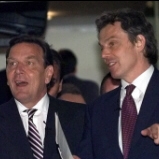|
Britain and Europe From world power to lone fighter
The British were once a world power. When, after the Second World War, talks on forming a
European Community began, Great Britain did not participate. The colonial empire was still
intact, and Great Britain hoped to be the third big power alongside the Soviet Union and
the USA. The illusion of still being a world power continued. It was only when the British
noticed in the sixties that their voice on foreign affairs was hardly being heard at all
in the chorus of the other two superpowers, that they sought co-operation with the other
European countries. De Gaulle, the then President of France, would have none of it. In
1963 and 1967 he used his veto against the entry of the United Kingdom into the European
Community. Only in 1973 was Great Britain able to become a member.
The British were hoping that membership of the
European Community (EC) would also revitalise their economy. However, they first became
one of the biggest net payers to the Union, i.e. they paid more to the EC than they got
from the communal pot. They did not consider in these calculations the economic advantages
that the European market gave them. The then Prime Minister Margaret Thatcher demanded:
"We want our money back". She had her way at the European level - selfishly and
without any consideration for the European partners. The EC returned the contributions.
Great Britain thus earned its reputation as a "difficult cousin" in the
Community.
Europhobia: What the English fear from the
continental mainland
While it was once the Labour-Party who opposed Europe, today the biggest
Euro-sceptics are Tories. Before the 1997 elections, the opponents and proponents of
Europe more or less balanced each other out. This was characterised by the statement of
the then Prime Minister John Major on the subject of joining the Currency Union:
"This government is firmly decided, without any ifs or buts, not to commit itself
before the election". A short time thereafter, the Conservatives were out of power,
and regrouped themselves. With the election of the new Leader of the Party, William Hague,
and the withdrawal of leading pro-Europe luminaries like former Chancellor of the
Exchequer, Clarke, and the erstwhile Deputy Premier, Heseltine, the party has shifted its
stance further towards the right. And the Europhobia is growing.
What good fortune it is that the House Of Lords does not determine policies. If they did,
England would not be a member of the European Union (EU) any more. In February 1997, the
House of Lords passed, by 52 votes, a bill that provides for the United Kingdom to
withdraw from the EU. There were 51 votes against. This was actually a political accident,
because the vote was held at a time when only a few Lords would be present. Not only was
it a Friday evening, it was also on the eve of one of the big events in the annual social
season, the last deer shoot; most of the Euro-sceptic Lords were already at home.
Nonetheless, there remained enough members to let Europe know what the aristocracy really
thought about it. Politically, this vote was inconsequential.
Blair's Europe politics: A constructive no.
The Blair government considers Europe to be a
chance and not a threat, according to Foreign Secretary Robin Cook. To start with, it
signed the Social Charter of the EU-agreement, which seeks to raise living and working
conditions to a minimum level all over Europe. The Tories had not signed this part of the
Maastricht Agreement. Next, the European Human Rights Convention - a charter of basic
rights that did not yet exist in this form in England (see Constitution) - is to be
adopted. However, no new ground is being broken in the relationship between England and
Europe, because the basic tendency of the English, to say yes to economic integration, but
no to political integration. Only the way of saying no will change: it is to be a
constructive no.
To the main
menue |
|
